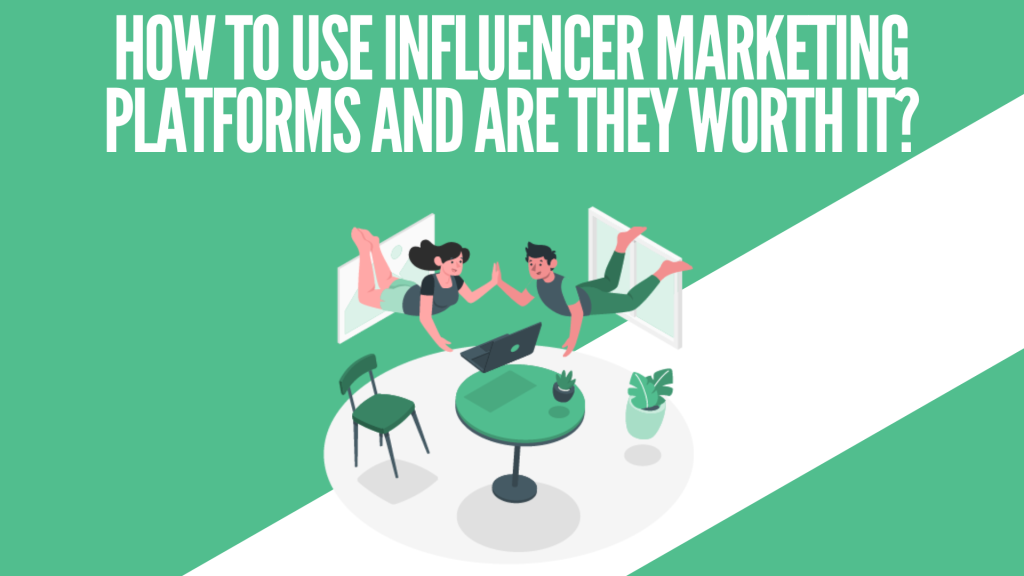
How to Use Influencer Marketing Platforms for Maximum Impact
In the fast-paced world of digital marketing, traditional methods often struggle to capture the attention of modern consumers. This is where influencer marketing steps in—a strategy that leverages the reach and credibility of influencers to create authentic connections with audiences. To navigate this landscape efficiently, influencer marketing platforms have emerged as indispensable tools. In this comprehensive guide, we'll unravel the mechanics of influencer marketing platforms and provide actionable insights on how to harness their potential for maximum impact.
Understanding the Essence of Influencer Marketing Platforms
At its core, influencer marketing platforms serve as bridges connecting brands with influencers. These platforms offer a unified space where brands can discover suitable influencers, manage campaigns, monitor performance, and ensure compliance. The purpose is to simplify the intricate influencer collaboration process, making it accessible and effective for brands of all sizes.
The Fundamental Mechanics of Influencer Marketing Platforms
Influencer Discovery: Finding the Right Match
In the vast sea of social media, finding the right influencers can be challenging. Influencer marketing platforms simplify this process through influencer discovery features. Brands can specify criteria such as niche, audience demographics, engagement rates, and even location. For example, if a fitness supplement brand is looking to target health-conscious millennials, the platform can help identify fitness influencers with engaged followers within that demographic.
Campaign Management: Efficient Collaboration
Managing influencer campaigns involves multiple stages, from negotiation to content creation and reporting. Influencer marketing platforms provide tools to streamline this process. Brands can communicate with influencers, share campaign briefs, set expectations, and monitor progress—all within a centralized dashboard. This eliminates the need for scattered communication and minimizes the potential for misunderstandings.
Performance Analytics: Data-Driven Insights
Measuring the success of influencer campaigns is crucial for refining strategies. Influencer marketing platforms offer performance analytics that provide insights into key metrics such as reach, engagement, clicks, and conversions. This data allows brands to assess the effectiveness of their campaigns and make informed decisions for future collaborations. For instance, a fashion brand can analyze which influencer's posts generated the highest engagement and tailor their future collaborations accordingly.
Compliance and Transparency: Upholding Ethical Standards
Maintaining compliance and transparency is paramount in influencer marketing. Many platforms provide features that ensure influencers disclose sponsored content appropriately. Additionally, brands can track and verify compliance with Federal Trade Commission (FTC) guidelines and disclosure regulations. This ensures that sponsored content is clearly labeled as such, maintaining trust between influencers, brands, and audiences.
Steps to Leverage Influencer Marketing Platforms Effectively
Define Your Objectives: Clarity is Key
Before delving into influencer collaborations, define your objectives clearly. Are you aiming to increase brand awareness, drive sales, or launch a new product? Understanding your goals helps you select the right influencers, design campaigns that align with your objectives, and measure success effectively.
Identify Your Target Audience: Know Your Customer
Effective influencer marketing starts with a deep understanding of your target audience. Who are your ideal customers? What are their interests, behaviors, and preferences? This information guides your search for influencers whose followers match your target demographic. For example, a sustainable fashion brand seeking environmentally conscious consumers should collaborate with influencers whose followers share similar values.
Research and Vet Influencers: Authenticity Matters
While influencer marketing platforms offer a vast selection of influencers, not all may align with your brand values or resonate with your audience. Thorough research is essential. Examine potential influencers' content, engagement rates, audience authenticity, and past brand partnerships. Authenticity is crucial in influencer marketing—choose influencers whose values align with yours to maintain authenticity and credibility.
Craft Compelling Campaign Briefs: Clarity in Communication
Successful influencer collaborations require clear communication. When crafting campaign briefs, provide comprehensive guidelines, expectations, and creative direction. This ensures that influencers understand your brand's message and vision, and can create content that resonates with their audience while staying true to your brand identity.
Monitor and Measure Performance: Data-Driven Decisions
Throughout the campaign, utilize the performance analytics provided by the influencer marketing platform. Monitor metrics such as engagement rates, click-through rates, and conversions. Compare the data against your objectives to assess the campaign's success. For instance, an electronics brand can track the impact of an influencer's unboxing video on their website traffic and sales conversions.
Build Long-Term Relationships: Beyond Transactions
Influencer marketing isn't confined to one-off campaigns. Building long-term relationships with influencers can yield greater authenticity and impact. Nurturing these relationships involves ongoing engagement, beyond campaign collaborations. This long-term approach creates a sense of loyalty and mutual benefit.
The Significance of Influencer Marketing Platforms
Streamlined Workflow: Efficiency Matters
Influencer marketing platforms streamline the workflow by providing a centralized hub for influencer collaborations. Brands can manage multiple campaigns, track communication, access performance data, and analyze insights all in one place. This efficiency saves time and resources, allowing brands to focus on strategic decisions and creative aspects.
Access to Diverse Influencers: Wide Reach
Influencer marketing platforms offer access to a diverse pool of influencers spanning various niches and industries. Whether you're targeting beauty enthusiasts, fitness aficionados, or tech experts, you can find influencers who resonate with your target audience. This diversity ensures that brands can identify influencers who genuinely connect with their specific audience.
Data-Driven Decision Making: Insights for Growth
Data is the cornerstone of effective influencer marketing. The performance analytics provided by influencer marketing platforms offer insights into which influencers generate the most engagement and conversions. This data empowers brands to make informed decisions, allocate resources wisely, and refine strategies for maximum impact.
Compliance and Transparency: Upholding Trust
Navigating legal and ethical considerations in influencer marketing is complex. Influencer marketing platforms help brands ensure compliance with disclosure regulations and foster transparency in sponsored content. This commitment to ethical practices maintains trust among influencers, brands, and audiences.
Future Trends in Influencer Marketing Platforms
AI-Powered Matching: Precision in Selection
As influencer marketing evolves, AI-powered algorithms will play a more significant role in matching brands with influencers. These algorithms will consider factors beyond follower count, such as audience demographics, engagement patterns, and even sentiment analysis of past content. This precision in selection enhances the potential for successful collaborations.
Performance Prediction: Anticipating Outcomes
Predictive analytics will enable brands to anticipate the potential performance of influencer campaigns. By analyzing historical data and engagement trends, brands can select influencers who are likely to deliver optimal results for specific objectives. This data-driven approach optimizes resource allocation and campaign effectiveness.
Authentic Micro-Influencers: Real Connections
Micro-influencers—individuals with smaller but highly engaged followings—are gaining prominence in influencer marketing. Influencer marketing platforms will focus on connecting brands with these authentic micro-influencers who can create genuine connections with their audience. Brands can leverage micro-influencers to tap into niche communities and foster meaningful engagement.
Conclusion
In the ever-evolving world of digital marketing, influencer marketing platforms stand as pivotal tools that empower brands to navigate the complexities of influencer collaborations with finesse. By embracing these platforms, brands can discover influencers, build long-term relationships, and measure performance effectively. Remember that influencer marketing transcends transactional partnerships—it's about creating genuine, resonant connections that leave a lasting impact on your audience. As the digital landscape continues to evolve, influencer marketing platforms remain essential assets for brands seeking to foster authentic relationships and drive meaningful engagement with their customers.
FAQs
Q1: Can influencer marketing platforms help small businesses with limited budgets?
A1: Absolutely. Many influencer marketing platforms offer a wide range of influencers with varying rates. Small businesses can collaborate with micro-influencers who offer authentic engagement at a fraction of the cost.
Q2: How do I ensure that the influencers are genuinely aligned with my brand?
A2: Thoroughly research potential influencers by reviewing their past content, engagement rates, and audience demographics. Look for influencers whose values and content resonate with your brand identity.
Q3: Can influencer marketing platforms help global brands with multilingual campaigns?
A3: Yes, influencer marketing platforms often have influencers from various regions who create content in different languages. This allows global brands to connect with influencers who can effectively reach diverse audiences.
Q4: What metrics should I focus on for measuring influencer campaign success?
A4: While engagement metrics like likes and comments are important, also track click-through rates, website traffic, and conversions. These metrics provide a holistic view of the campaign's impact on audience behavior.
Q5: How can I ensure that my influencer campaigns comply with regulations?
A5: Influencer marketing platforms typically provide guidelines and features to ensure compliance with regulations such as FTC guidelines. Additionally, educating influencers on proper disclosure practices is essential for transparent collaborations.
More Digital Marketing Blogs





